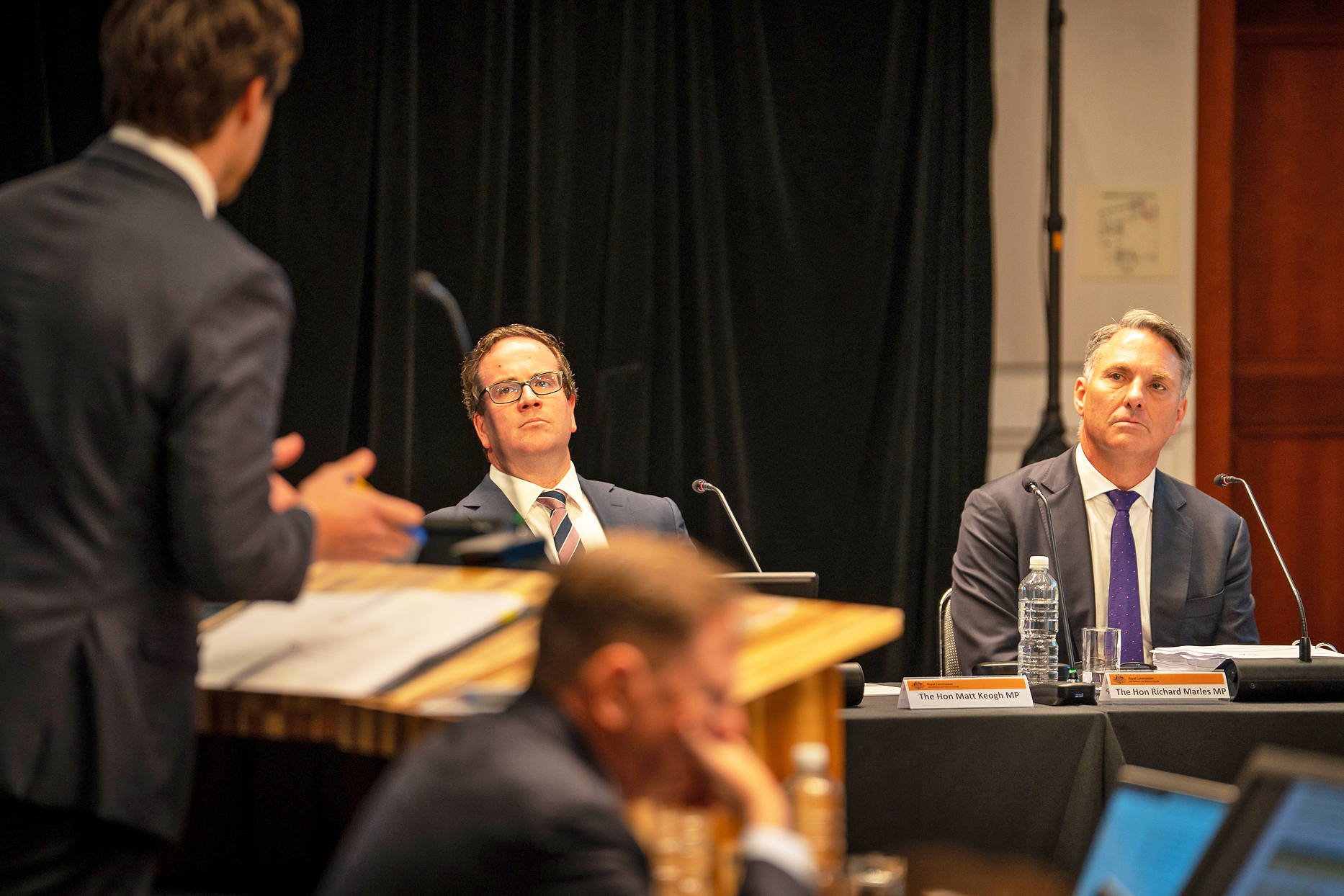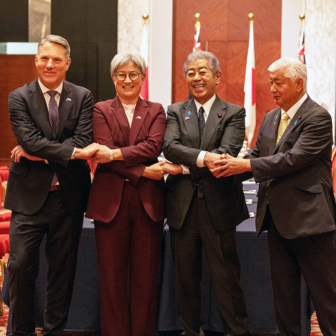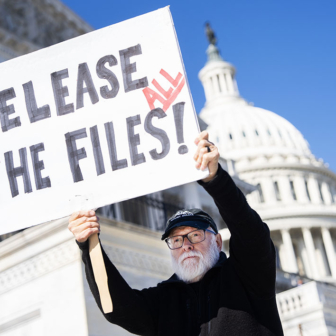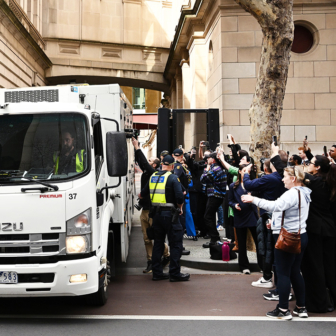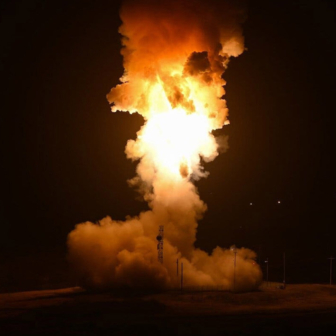It was not quite a “mission accomplished” moment, but there were echoes of George W. Bush’s hubristic declaration in May 2003 that the United States invasion of Iraq had largely met its goals — not long before the country descended into bitter sectarian warfare and eight years before the last US combat troops were able to withdraw.
Defence minister Richard Marles took the floor in federal parliament last Thursday to draw a line under the government’s response to what he conceded were “arguably the most serious allegations of war crimes in our history” — the finding by the Brereton inquiry that twenty-five Australian special forces personnel had been involved in the unlawful killing of thirty-nine people during Australia’s engagement in the conflict in Afghanistan, the catastrophe that presaged the debacle of the war in Iraq.
“I advise the House that the work of the Afghanistan Inquiry Reform Program has formally concluded and with this the government formally closes its response to the Brereton report,” Marles proclaimed, before later adding: “The Brereton report and its recommendations offered a defining opportunity for Defence and the nation to do right in the face of wrong. While the journey continues, we have met this challenge. Defence is a different organisation to the one that existed at the end of the war in Afghanistan: better positioned to prevent, detect and respond to unlawful, unethical and unacceptable behaviours in the future.”
The timing of Marles’s statement — almost four years after major-general Paul Brereton delivered his shocking findings — smacked of a political diversionary tactic. Four days earlier, another report tabled in parliament had revealed ample evidence that, far from having been transformed since Australia quit Afghanistan, our Defence establishment remains in a state of dysfunction and denial.
The final report of the three-year royal commission into defence and veteran suicide exposed not only the magnitude of an epidemic of suicide among serving defence personnel and veterans but a military command structure and bureaucracy failing to manage the crisis and the factors driving it — not least widespread sexual abuse within the forces — and failing in its obligations to assist victims.
The report confirmed more than 2000 suicides by serving and former members of the Australian Defence Force between 1985 and 2021 — twenty times the incidence of death in combat — and estimated the actual death toll to be substantially higher. It concluded that this continuing and “unacceptably high” suicide rate was driven not just by factors such as post-traumatic stress, family separation, harassment and victimisation and senior officers ignoring bullying. High rates of sexual abuse were singled out as a significant driver of suicides within the services.
“Men and women serving in the ADF have joined knowing they may be required to make the ultimate sacrifice for their country,” the report said. “However, for many members, the greatest source of danger comes from within the ADF itself.”
The royal commission found that about 800 sexual assaults had been reported in the ADF during the past five years and received multiple submissions from victims of “historic and contemporary” gang rapes. It also reported a Defence estimate that 60 per cent of sexual assaults were not reported.
“The impact of sexual violence on serving and ex-serving members cannot be overstated,” the commissioners said. “It is nothing short of horrific and increases the risk of suicide and suicidality. Beyond the trauma that results from the act of sexual violence itself, the institutional response from the ADF (or lack thereof) can often exacerbate the victim’s pain and suffering.”
The ADF’s woeful handling of the suicide crisis was highlighted by the fact that the leadership couldn’t accurately quantify the prevalence of all forms of sexual violence in its workplace. Nor did the ADF know how many serving members had been convicted of sexual offences in civilian courts — even when the offence was perpetrated against another serving member. Alarmingly, fourteen members convicted of sexual offences by the military justice system remained in the services.
The royal commission report noted that in 2021 the inspector-general of the ADF had initiated a four-month inquiry into military justice arrangements for dealing with sexual violence. The commission found that many of that inquiry’s recommendations had still not been fully implemented. “Significantly more work is needed before the ADF can confidently say it is doing all it can to protect its members from sexual violence at work, and the associated risks of suicide,” it concluded.
The performance of the Department of Veterans Affairs, the principal government agency tasked with servicing the needs of veterans, also attracted strong criticism. Despite the government’s promise that claims submitted under the Military Rehabilitation and Compensation Act would be processed within ninety days, the royal commission reported that DVA’s current performance target was to achieve that timeframe for just 50 per cent of claims.
The report amplified long-running media coverage of the poor handling of veterans’ claims, with submissions describing the department’s claims system as “impossible to navigate” and “overwhelming.” Veterans making claims often relied on support from volunteers with ex-service organisations, an unsustainable situation given the ageing of that workforce. At the same time, annual grant funding of just $4.7 million was provided last financial year for veteran advocacy compared to $4 million a decade ago.
The royal commission also found that the DVA failed to measure how many veterans were achieving their goals within its rehabilitation program and therefore could not accurately measure its effectiveness. With no right to choose their own rehabilitation provider and less flexibility in paying for home assistance, DVA clients were worse off than clients of the National Disability Insurance Scheme.
The report scored a humiliating fail for the department on one of its core responsibilities: “Based on the evidence we have heard throughout the royal commission, we do not believe that the DVA in its current form can deliver optimum wellbeing support to the veteran community and address the risks of suicide and suicidality. The scale of this task should not be underestimated. It cannot be delivered within DVA’s existing resources, nor within its current skillset.” It called for the creation of a new executive agency focused on veterans’ wellbeing to ensure veterans received the help they needed when they needed it: “It should have distinctive branding from DVA and represent a fresh start to rebuilding trust with the veteran community.”
The royal commission further noted that mental health problems fuelling the suicide crisis were being exacerbated by manpower shortages within the armed services. The ADF is reported to be 5000 short of its authorised personnel strength in the army, navy and air force, a shortfall of about 10 per cent that reflects the struggle to attract new recruits — a struggle that will not be helped by the latest controversies. It found that manpower shortages were contributing to “burnout and fatigue” among service men and women that put them at greater risk of injury.
While the broader state of the armed forces was outside the commission’s terms of reference, a timely new book based on the first independent study of institutional abuse within the military has detailed the failure of repeated efforts to reform Australia’s army, navy and air force over the past half century.
In Warrior Soldier Brigand: Institutional Abuse within the Australian Defence Force, sociologist Ben Wadham and military historian James Connor point out that fundamental problems of equal opportunity, diversity, violence and sexual harassment persist within the forces despite thirty-five reviews and inquiries since 1969.
Wadham and Connor argue that an entrenched, secretive and defensive culture within the ADF has resisted repeated efforts to reform and modernise the armed forces in line with changing community standards and expectations. Underlying their “poor reputation, recruitment and retention” is a failure by successive governments to achieve fundamental change.
“Our conclusion is that the ADF command manages the public’s perception and scandals of institutional abuse according to its own terms, indicating what we see as an othering of civil society and executive government,” they write. “Military forces appear to operate as a law unto themselves, and when civilian influences penetrate their perimeter, the institution operates tactically and martially. The threat is identified, targeted and neutralised. If there is one solution to reducing or ending military institutional abuse, it is to ensure that the ADF is independently scrutinised and rendered accountable to wider social and community norms.”
So much for Minister Marles’s portrayal of a Defence establishment transformed since the dark days of the Afghanistan engagement. While his statement about the responses to the Brereton inquiry largely succeeded in diverting attention away from bombshells embedded in the royal commission report, he tripped on another landmine in the process.
Marles declared that the government had responded to all 143 of Brereton’s recommendations except for the four relating to the prosecution of war crimes that are now before the Office of the Special Investigator, and one that has been awaiting his decision for more than a year.
Brereton recommended that a group of junior to mid-ranking officers who had served in Afghanistan be stripped of the Distinguished Service Cross, a medal awarded for “command and leadership in military action.” He argued that while these officers were not accused of war crimes and, indeed, had no knowledge of the crimes committed by the men under their command, they should nonetheless be penalised for failing their “moral command responsibility and accountability.”
In May last year, then defence force chief Angus Campbell wrote to those officers advising them that he had recommended to the minister that their awards be terminated. In the end, Marles is reported to have written to nine officers confirming the cancellation of their DSCs, fewer than Campbell had flagged. (Campbell, who had earlier commanded Australian forces in the Middle East and Afghanistan, offered to relinquish his DSC several years ago but the offer was rejected by the Morrison government.)
Marles’s announcement of the medal cancellations provoked a furious reaction from veterans groups and the opposition. RSL president Greg Melick argued that no medals should be revoked until all investigations and potential prosecutions had been completed. The loudest criticism was that frontline officers were being collectively punished while senior officers were being spared accountability and culpability. Jacquie Lambie told the Senate: “This absolutely stacks on diggers while the top brass and generals go without any accountability. It has to stop.”
A point that evaded much of the outrage was that while a small group of officers were losing their medals none of the twenty-five current and former personnel implicated by Brereton in the unlawful killings in Afghanistan — including many highly decorated individuals — were losing theirs.
Last year a marathon defamation trial in the NSW Supreme Court over reporting by Nine newspapers’ Nick McKenzie and Chris Masters ended with Justice Anthony Besanko finding that former SAS corporal and Victoria Cross winner Ben Roberts-Smith was a liar, a serial bully and a war criminal. Besanko found it was “substantially true” that he had been involved in the murder of four unarmed Afghan prisoners and civilians, had intimidated and threatened court witnesses to the hide the truth, and had lied repeatedly in his sworn evidence.
That finding appears to have done nothing to dampen the chutzpah of Ben Roberts-Smith, who appealed the decision and continues to protest his innocence. On Anzac Day, he attended the dawn service in Perth, proudly wearing his tarnished medals. In June he was welcomed at Government House in Perth to receive another one — the King’s Coronation Medal, awarded to all living VC recipients by Buckingham Palace. As the Age reported, he was also among more than 1000 guests at the lavish “Wanderer’s Ball” that recently celebrated the sixtieth anniversary of the SAS.
One of the most dispiriting asides in Richard Marles’s statement to parliament was that the wheels of justice are grinding excruciatingly slowly as the prosecution cases are being prepared against those accused of the gravest war crimes in the Brereton report. While confirming that the work was “ongoing,” Marles added: “Any prosecutions which are pursued by the Office of the Special Investigator will take years to complete.”
It is understood that the prosecutions team, operating under the highest levels of security within the Defence headquarters in Canberra, is taking painstaking steps to ensure that evidence and testimony presented during the Roberts-Smith defamation case is not excluded because of the different standards in a civil trial. The team is also understood to be reviewing shocking and high-incriminating footage of atrocities captured on the helmet cameras worn by many SAS troopers in Afghanistan. The Age has now reported that “equally egregious” new alleged crimes are being examined by the special investigator in addition to the four killings Justice Besanko found Ben Roberts-Smith was involved in.
Having summarily cancelled the medal entitlements of a clutch of mid-ranking officers who served in Afghanistan, the Albanese government has at least created a precedent that means there can be no justification for Roberts-Smith retaining his Victoria Cross — and his liberty — in the event that he is found guilty of any of the alleged crimes. •
